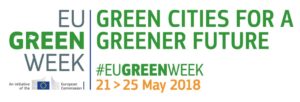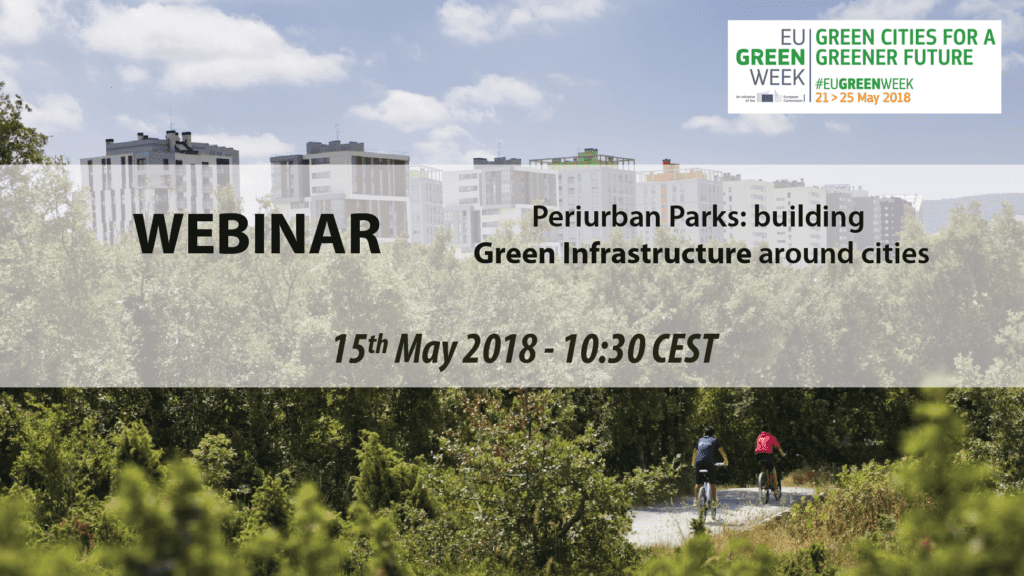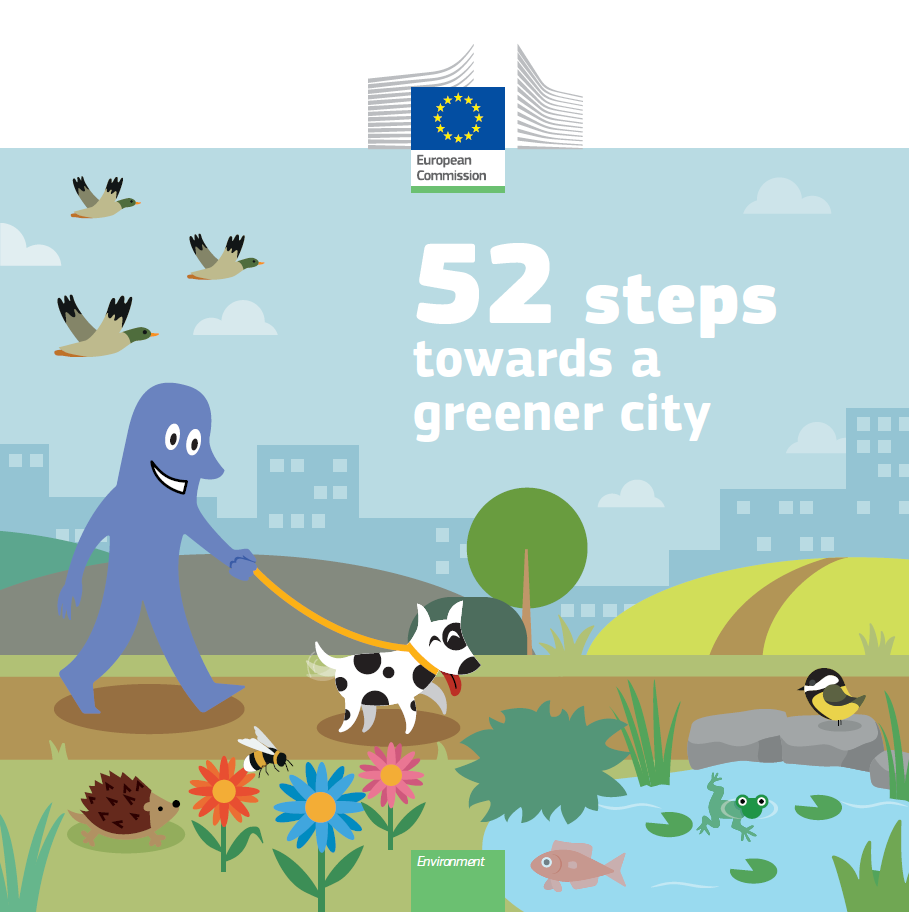“Green cities do better” – EUROPARC at EU Green Week 2018
EU Green Week 2018 © European Commission DG Environment
Last week was a special week for all Protected Areas in Europe. Starting with the celebration of the Natura 2000 Day that matched the opening of the EU Green Week 2018, the Natura 2000 Awards Ceremony, and closing with the celebration of the European Day of Parks! This meant also a very intensive week for EUROPARC network, especially in our Brussels office. Below, the main highlights of the Green Week for Parks across Europe.
“Green cities do better”
was the message of the EU Green Week 2018, that a took place from 21 to 25 May 2018, with the objective this year of drawing attention to the benefits of bringing nature into our cities. This year, the kick-off took place in Utrecht, Netherlands on the 21st May: the Natura 2000 Day. There, the European Commissioner for the Environment, Karmenu Vella, together with local and national representatives, and the Executive Director of the United Nation’s Environment Program, officially launched the Week.
Building a city that is genuinely sustainable and ‘fit for the future’ takes vision, a long-term perspective, and investment
The role of Periurban Parks
As now the official representative network of Periurban Parks, following last years’ integration of FEDENATUR into EUROPARC, we organised a special webinar dedicated to the role of Protected Areas building Green infrastructure in and around cities. The webinar was organised by the members of the EUROPARC Periurban Commission and two case studies reflecting different geographical realities were presented: the green ring of Victoria-Gasteiz and the Green Strategy of the Barcelona Metropolitan Area.
“Nature in the City” Workshop
On the 23rd May, EUROPARC supported the organisation of the workshop in Brussels “Nature in the city“, where we looked from different perspectives on how nature-based solutions and green infrastructure can provides solutions for urban challenges and increase citizens’ quality, health & social life. Our invited speaker, Wilma Zijlema, Post-Doctoral Researcher at the ISGlobal, Barcelona Institute for Global Health, presented the case study of Collserola Nature Park in the outskirts of Barcelona, and the importance it has to the livelihoods of its citizens.
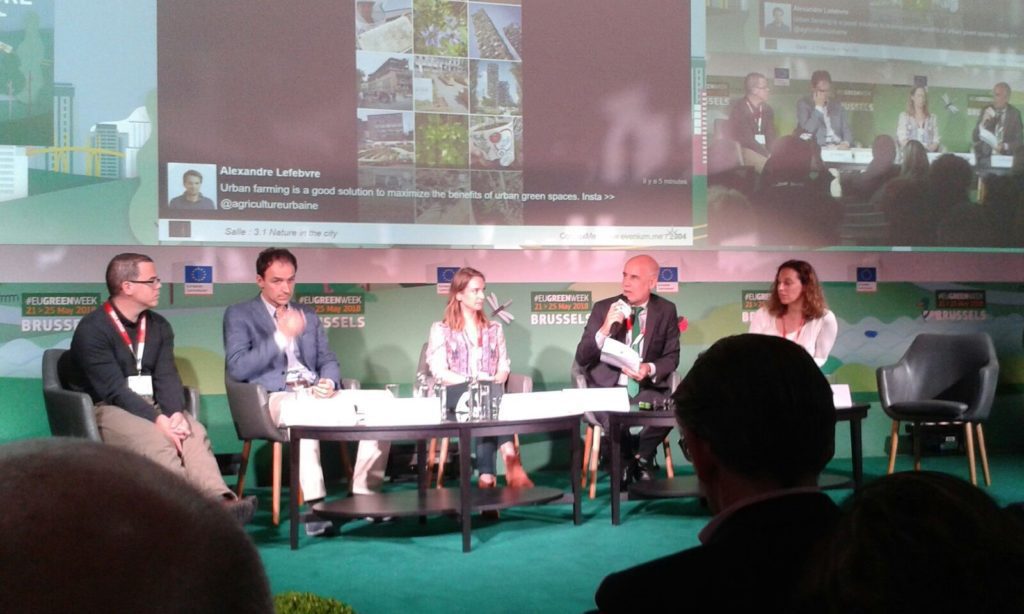
Workshop Nature in the city – EU Green week 2018 © European Commission
The presentations are available for download here. The session was moderated by Humberto Delgado Rosa, Director for Natural Capital at the Directorate-General for Environment, European Commission; and other perspectives were shared by Nick Paling, Head of Data, Evidence & Communications, Westcountry Rivers Trust (UK); Dr Davide Geneletti, Associate Professor, Planning & Design for Sustainable Places Lab, DICAM – University of Trento (Italy); Gitty Korsuize, Consultant, Green Areas & Urban Nature (The Netherlands); and Patrick ten Brink, Director for EU Policy, European Environmental Bureau.
“52 steps towards a greener city”
A green city depends not only on land planning cabinets and governmental organizations. There is a wide range of actions that can be done by each citizen, towards having a more environmental-friendly lifestyle in the city. That is why the European Commission launched the guide “52 steps towards a greener city” available for download in all members’ languages.
During the week there was also another celebration day: the European Day of Parks, 24th May, where EUROPARC and IUCN organized a Webinar about “Solutions from European Protected Areas“ to promote examples of successful approaches from 2 different regions in Europe.
EU Large Carnivore Platform Meeting: Comparing good practice across the EU
The fifth annual meeting of the EU Platform on Coexistence between People and Large Carnivores took place yesterday in Brussels. The Platform brings together representatives from landowning, herding, hunting, research and conservation organisations to “promote ways and means to minimize and find solutions to conflicts between people and large carnivores”. The Plenary meeting is the annual opportunity for the Platform members to review their work plan and agree the next years’ work.
EU Large Carnivore Platform Plenary Meeting: Comparing good practice across the EU
The agenda started with a situation review, examining large carnivore status across the EU. The IUCN Species Specialist Group – the Large Carnivore Initiative for Europe (LCIE) has carried out a major information gathering exercise to bring together and analyse the information on large carnivore numbers, ranges, damages and threats to conservation. An early version of the results was presented to the Platform members, full results will be ready published later this year. Linked to this item, the Platform reviewed how protection measures are being implemented in the EU and how member states fund such measures through national or European funding.
The work of national and regional large carnivore platforms and how the EU Platform can support, exchange with, and learn from them were also discussed. A final item on the agenda was a review of information on fear and risk associated with large carnivores. The Platform discussed good practices for addressing the fear of large carnivores.
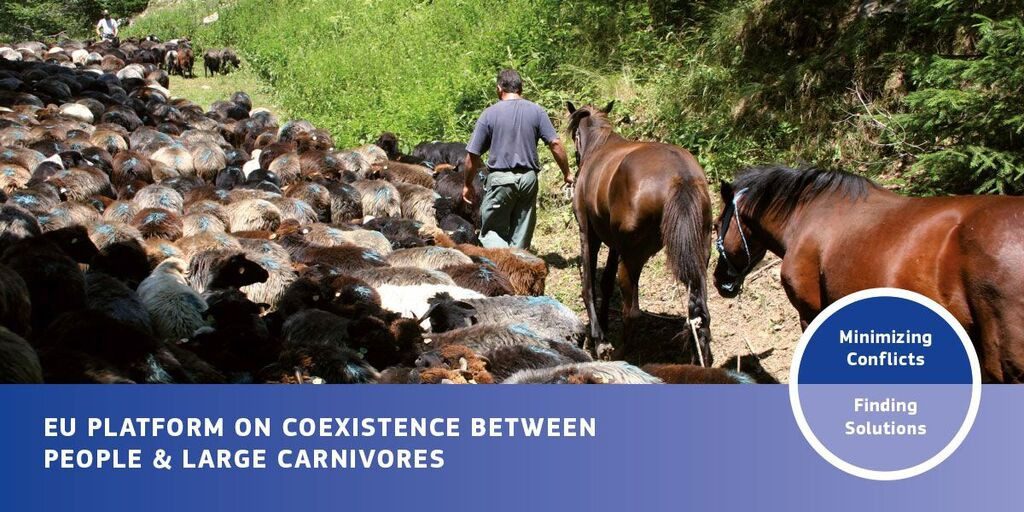
Humberto Delgado-Rosa, Director for Natural Capital, DG Environment, who co-chairs the meeting for the European Commission, said:
The focus of this group on coexistence is very important. The Platform supports constructive dialogue without neglecting socio-economic impacts. We understand well that there is real hardship associated with the presence of large carnivores, particularly for livestock managers in some locations, and targeted support is needed. With the establishment of regional platforms in different member states, the role of the EU Platform to link these initiatives in conflict areas becomes increasingly important.
Thierry de l’Escaille, Secretary General of the European Landowners Organization and co-chair of the Platform said: “The Platform provides a useful forum for bringing together a range of different interests to discuss some of the issues surrounding coexistence with large carnivores. Useful discussions have taken place on a number of conflict issues, such as how to finance protection measures for livestock and beekeepers and also the increasingly important issue of fear of large carnivores. We hope that by providing balanced, impartial information on these issues, we can promote constructive dialogue between different interest groups.”
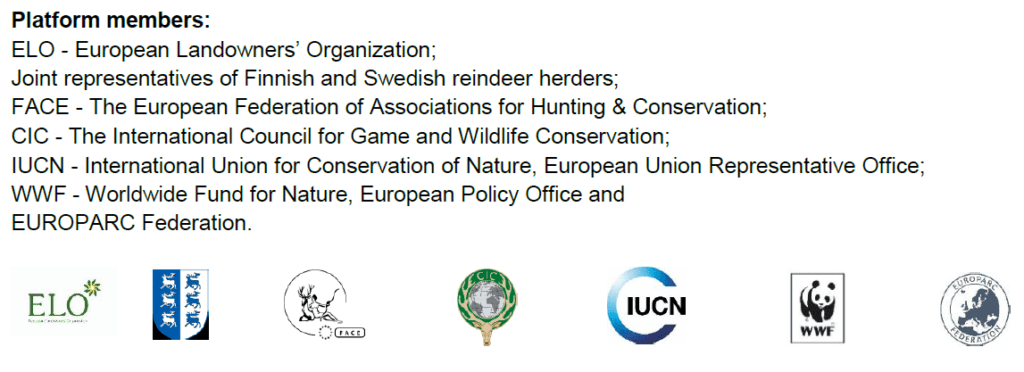
To learn more about the platform on the Coexistence between people and large carnivores please visit the platform website.
Participatory planning of sustainable tourism in Protected Areas
The Interreg CEETO project (Central Europe Eco-Tourism) entered the implementation phase with the workshop on participatory planning of sustainable tourism in Protected Areas and its work at local on the 8 pilot areas. The meeting will take place in Austria, on the 4-5 June.
Management bodies of Protected Areas partners will be supported in the participatory planning process to define the local Sustainable Tourism Action Plan, supplying them with guidelines and methodological tools. For example, the Capacity Building Workplan will allow the managers of each Protected Area to define their own tailored participatory planning process, according to their specific context, level of local stakeholder involvement and tourism monitoring needs and priorities.
It will also be discussed the correct approach towards participatory planning and how to carry out a correct assessment before starting the implementation of the process in the framework of CEETO Project; and how to design an incisive, effective and time-saving participatory planning process.
Participatory Mapping will be used to define the most precious/valuable areas to preserve and promote in the Protected Area, the most vulnerable areas endangered by tourism pressure, the most relevant tourism flows that cross the Protected Area.
During the Workshop will be tested the World Cafe methodology designed to create a collaborative environment to develop concrete actions and initiatives from multiple ideas coming from different stakeholders. In fact, World Cafe combines interactions between stakeholders and multiple focus group on different thematics and topics. So that scientific, technical and community knowledge are committed to the same goal.
More info and regular udates on : https://www.interreg-central.eu/CEETO
Elections for a Youth Representative in EUROPARC Council
Youth Conference 2013 Hungary © Gabor Nagy
EUROPARC recently developed an outline Youth+ program to provide skills and experience in leadership, advocacy and communication, to enable young people to more fully take part in the governance, management, activities and support of protected areas. Additionally EUROPARC is now seeking to provide such a leadership and training opportunity through a youth representative in EUROPARC Council.
Elections for a Youth Representative in the Council of the EUROPARC Federation
Mandate 2018-2020
ROLE of the YOUTH REPRESENTATIVE:
- Assist and advise the Council on how to oversee the work of the EUROPARC Federation;
- Bring extra insight to Council: a youth perspective to identify and solve problems arising from the changing agenda for biodiversity and sustainable development in protected areas;
- Work with the Directorate, as necessary to provide regular reports to the Council on the development of the Youth + programme;
- Represent the EUROPARC Federation, where appropriate – in dialogue and exchange with youth organisations and networks at the European level;
- Assist EUROPARC to increase the involvement of young people its decision-making and in the work of protected areas;
- Share information and provide feedbacks to youth in protected areas across Europe;
- The Youth representative should attend at least 2 council face to face meetings per year.
The Directorate and Council will provide induction information and a mentor to support the youth representative in the course of its mandate. EUROPARC will cover travel and accommodation costs for the participation to relevant meetings and events.
Get to know Laura Peters, the first elected Youth representative in EUROPARC Council, for the period of 2016-2018. Laura explains the work of the Youth representative in the Council.
Candidate requirements:
- Be between 18-25 years at the submission of the application;
- Have been part of a Junior Ranger programme or have undertaken relevant and regular volunteer work in Protected Areas member of EUROPARC. Have been a participant in the Youth Conference (2013) and/or the Youth+ Camp (2015) and other activities promoted by EUROPARC is an asset, but not considered indispensable.
- Be highly motivated, willing to learn and have a good English level; this engagement should be an added value in the curriculum of the candidate and not causing negative impacts on his/her involvement in university or others;
- Be supported by his/her protected area of origin;
- Be available at least 3 times a year for 2-3 days during the week (dates and location are agreed few months before the meetings); once a year the meeting can be also done via video conferencing
MANDATE:
The Youth representative is elected for 2 years, until July 2020. The youth representative can be re-elected once if the age requirements are still fulfilled.
How to apply:
Candidates to this position must submit their application before the 22 June 2018, sending the motivation letter and a short video message (3 min max) to introduce themselves, their motivations and to present how they are willing to contribute to the work of the EUROPARC Council.
Download the motivation letter (an automatic download will start)
Election procedures:
Once the applications received, a jury, composed of representatives of the EUROPARC Council and Directorate, will evaluate the candidatures and select those suitable for the position. The selection will be made taking into account the fulfillment of the requirements and the quality of the application submitted. Successful candidates will be informed, and their video and motivation letter will be made available on the EUROPARC website.
All participants of the Youth Conference 2013, the Youth+ Camp 2015 and the Youth Council will be invited to express their vote before the 15th July 2018.
The elected candidate will then be announced and invited to attend the EUROPARC Council Meeting in the Cairngorms National Park – UK, during EUROPARC Conference 2018.
Are you willing to apply?
– send your application with your motivations and your video via wetransfer to s.burger at europarc.org
This should be received by us before the 22nd June 12:00 (GMT). Applications received after this time will not be considered. For further information, please contact f.minozzi at europarc.org.
